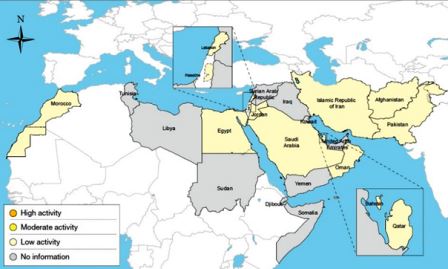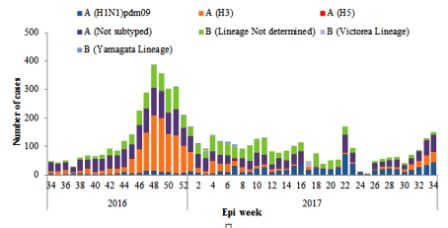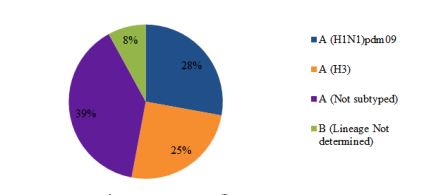In the WHO Eastern Mediterranean Region, influenza activity remained low in August in countries reporting data to FluNet and EMFLU namely, Afghanistan, Bahrain, Egypt, Islamic Republic of Iran, Jordan, Lebanon, Morocco, occupied Palestinian territory, Oman, Pakistan, Qatar and Saudi Arabia (Fig. 1). All seasonal influenza subtypes were detected in the Region.

Disclaimer: The presentation of material on the maps contained herein does not imply the expression of any opinion whatsoever on the part of the World Health Organization concerning the legal status of any country, territory, city or areas or its authorities of its frontiers or boundaries. Dotted lines on maps represent approximate border areas for which there may not yet be full agreement.
Fig. 1. Influenza activity in Eastern Mediterranean Region, August 2017
Influenza activity by subtype
- In August 2017, no new cases of influenza A(H5N1) were reported in Egypt.
- In the western Asia influenza transmission zone, Oman, Qatar and Saudi Arabia reported circulation of all seasonal influenza subtypes, while Bahrain, Jordan and Lebanon reported no influenza activity.
- In southern Asia transmission zone, Iran (Islamic Republic of) reported circulation of sporadic cases of influenza B while Pakistan reported sporadic cases of the all seasonal influenza subtypes.
Fig. 2 shows the weekly distribution of influeza subtypes.

Fig. 2. Weekly positive cases of influenza by subtype, Epi week 34/2016–2017
Circulating influenza viruses by subtype
- During August 2017, regional national influenza centres and influenza laboratories tested a total of 2242 specimens for influenza viruses of which 438 tested positive.
- The average percentage of positivity rates is 7%, with highest positivity rate recorded in Qatar.
- Of the viruses tested, 403 (92%) were influenza A viruses, including 122 (28%) influenza A/H1N1pdm09 viruses and 110 (25%) were influenza A/H3 viruses; 35 (8%) were influenza B viruses (Fig. 3).





